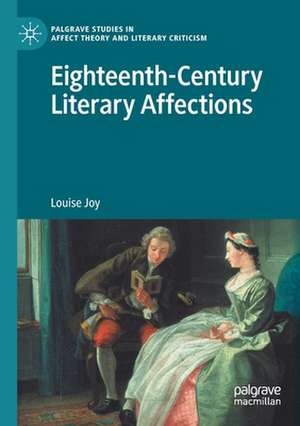Eighteenth-Century Literary Affections: Palgrave Studies in Affect Theory and Literary Criticism
Autor Louise Joyen Limba Engleză Paperback – 31 iul 2021
| Toate formatele și edițiile | Preț | Express |
|---|---|---|
| Paperback (1) | 578.70 lei 6-8 săpt. | |
| Springer International Publishing – 31 iul 2021 | 578.70 lei 6-8 săpt. | |
| Hardback (1) | 583.93 lei 6-8 săpt. | |
| Springer International Publishing – 30 iul 2020 | 583.93 lei 6-8 săpt. |
Preț: 578.70 lei
Preț vechi: 680.82 lei
-15% Nou
Puncte Express: 868
Preț estimativ în valută:
110.75€ • 113.42$ • 92.12£
110.75€ • 113.42$ • 92.12£
Carte tipărită la comandă
Livrare economică 19 martie-02 aprilie
Preluare comenzi: 021 569.72.76
Specificații
ISBN-13: 9783030460105
ISBN-10: 303046010X
Pagini: 215
Ilustrații: VIII, 215 p.
Dimensiuni: 148 x 210 mm
Greutate: 0.27 kg
Ediția:1st ed. 2020
Editura: Springer International Publishing
Colecția Palgrave Macmillan
Seria Palgrave Studies in Affect Theory and Literary Criticism
Locul publicării:Cham, Switzerland
ISBN-10: 303046010X
Pagini: 215
Ilustrații: VIII, 215 p.
Dimensiuni: 148 x 210 mm
Greutate: 0.27 kg
Ediția:1st ed. 2020
Editura: Springer International Publishing
Colecția Palgrave Macmillan
Seria Palgrave Studies in Affect Theory and Literary Criticism
Locul publicării:Cham, Switzerland
Cuprins
1. Chapter 1: Introduction: Affective Knowledge.- 2. Chapter 2: Model Affections.- 3. Chapter 3: Literary Passions.- 4. Chapter 4: Novel Feelings.- 5. Chapter 5: Translated Emotions.- 6. Chapter 6: Poetic Pathos.- 7. Chapter 7: Epilogue: Literary Affections.
Notă biografică
Louise Joy is Fellow, Director of Studies in English, and Vice-Principal of Homerton College, University of Cambridge, UK. She is the author of Literature’s Children: The Critical Child and the Art of Idealization (2019) and has published widely on eighteenth-century literature and the history and philosophy of education.
Textul de pe ultima copertă
This book assesses the mediating role played by 'affections' in eighteenth-century contestations about reason and passion, questioning their availability and desirability outside textual form. It examines the formulation and idealization of this affective category in works by Isaac Watts, Lord Shaftesbury, Mary Hays, William Godwin, Helen Maria Williams, and William Wordsworth. Part I outlines how affections are invested with utopian potential in theology, moral philosophy, and criticism, re-imagining what it might mean to know emotion. Part II considers attempts of writers at the end of the period to draw affections into literature as a means of negotiating a middle way between realism and idealism, expressivism and didacticism, particularity and abstraction, subjectivity and objectivity, femininity and masculinity, radicalism and conservatism, and the foreign and the domestic.
Caracteristici
Helps to define the affective vocabulary of the eighteenth-century Brings marginalized works, especially by women writers, alongside canonical texts Suggests a line of continuity between eighteenth-century ideas about affection and the much-used concept of “affect”












